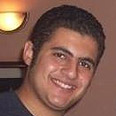
Egyptian threatened over interest in Israel
Hussein, a Hebrew student, harassed by authorities after walking out of Israeli Academic Center in Cairo. 'I believe in peace, but at the moment fear defeats the faith,' he tells Ynet
One of the visitors even told Ynet he had received a clear threaten not to return to the center and not to contact Israelis.
The center was established in the early 1980s as part of the peace agreement between Israel and Egypt, in a bid to advance the cultural and academic ties between the two countries.
Egyptian students, researchers and curious residents visiting the place can browse Amos Oz Books or read Israeli academic studies in the impressive library. The center also screens films and hosts Israeli lecturers.

Building on Nile (center). Island of normalization (Photo: Gilad Mulian)
Hussein Baker, 20, a fourth-year Hebrew student at Menoufia University, near the Egyptian capital, was enthusiastic after reading about the center in the newspaper.
"When I entered the building, I could not believe there was not one soldier or police officer there," he told Ynet in fluent Hebrew. "The building appeared quiet and normal, like any other building in the city. When I stood before the sign reading, 'The Israeli Academic Center in Cairo,' written in Hebrew and Arabic letters, I felt very excited."
He was intrigued, sat down for several hours reading newspapers and books, and even borrowed and took some home. "I asked them to contact me about events at the center, and I left with the intention of returning." But his plans were interrupted by reality.
'Don't visit the center again'
"As I was walking down the street, wondering why the Egyptian cultural elite refuses with all its might to allow cultural normalization between the countries, and thinking how much this could help the peace process, I suddenly heard a voice calling my name. 'Hello, Hussein,' said the man, who presented himself as Staff Sergeant Hossam of the state's security service.
"I looked at him, alarmed, and asked if I had done anything wrong. He said he only wanted to ask a few questions and began asking me why I visited the center, who I met there, what I think about Israel and what do the Israelis write about Egypt in their newspapers."
Baker answered the question and the security officer let him go. "I thought, innocently, that the affair was over, because it was pretty acceptable for a student of the Hebrew language to visit the center for study purposes."
A week later, however, Baker's girlfriend received a phone call from another security officer, who asked her about her boyfriend, his studies and his political opinions.
"When she told me about it, I didn’t know what to do. I thought it was only a small investigation about me and that I should just ignore it, but today I received a phone call from the Israeli center, which made me very happy. They informed me that next Tuesday they will be screening the film "Someone to Run With", based on a David Grossman book. I didn't even have time to internalize the information, because several minutes later I received a call from an unidentified number."
Baker knew who was on the other side of the line. "An Egyptian officer began asking me questions of yes and no, only to prove that he knows everything about me. He then told me, 'Don't visit the center again.' I didn’t like his attitude and insisted that I was a free citizen allowed to go wherever I want.
"In response, he used a threatening and insolent tone, and I was so scared that I told him I would not visit the center anymore. This brought the phone call to an end, as well as my dreams of normalization and peace."
'Very hard to deal with these people'
Baker now fears that another threatening phone call will arrive following his conversation with Ynet. "What they are doing is not only anti-Israel, but anti-human," he says. "The Egyptian government has already signed a peace agreement with Israel, and now they are telling me not to contact Israelis? I did not visit the embassy. I came with the academic intention of reading books and figures.
"I would really like to attend the film's screening, but I'm afraid. It's very hard to deal with these people. The Egyptian security forces are known for their special treatment of problematic citizens. I don’t want them to hurt me or my studies. I'm still young. I believe in peace with Israel, but at the moment fear defeats the faith."
The center's manager, Prof. Gabi Rosenabum, is familiar with the claims. "This is an ancient story, which my predecessors tried to deal with at the time, to no avail," he told Ynet.
"I am not familiar with Hussein's personal story, but we definitely know about the authorities' attempts to convince people not to visit us. I don’t know what they do it. In the past they gave us all kinds of strange answers, and they won't admit it in general. They say they are only trying to guard the place and take care of our personal security."
Rosenbaum stresses that the center cannot do anything about the matter. "I hope it stops in the future, but I'm realistic. I don’t believe it will happen. The only thing I can say to those visitors who are threatened is that from my experience, those who insist on visiting the center are eventually left alone."
Initial information received via Red Email










